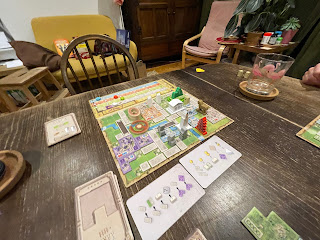Adam, Hannah and Arthur were our hosts last night as we belatedly marked Katy's birthday with cake (brought by Katy) and kicked off the evening with an injection of comestible caterpillar while Arthur loaded the table with potential games we could play. As an eight however - along with the hosts and Katy, there were Martin, Ian, Joe and myself - we settled on Codenames Pictures. I was clue-giver for the Hillmann-Morrison team and Joe clued for everyone else.
We got off to a good start with the team successfully reconciling my clues for mischief before Joe's team hit back, opening with a salvo of success and following it with such wild and wacky clues as 'Linux' (Martin remembered there was a Penguin, Katy spotted a penguin in the cards) and we stumbled on my clue of breakfast as I hadn't spotted a melting clock was actually dribbling out of a saucepan. These are the kind of sentences you don't write about original Codenames!
Arthur/Adam/Hannah/Sam: clues crocked
In theory it was now Arthur's bedtime, so we separated into two groups for the evening's main dishes. Ian Adam and Katy ruminated on a Mad King Ludwig rematch before settling on World Wonders after Katy saw the bits. Martin took Joe and I into the other room and talked us through Dawn of Ulos, which he'd been sent to review.
The game wears its influences on its sleeve, apparently, being a mash-up of Acquire in it's shareholding and takeovers and Tigris & Euphrates in how said takeovers are resolved: here, rather than investing in buildings we are backing various factions on the map. Each turn you must play a tile that will strengthen an existing faction or perhaps introduce (or re-introduce) a new one, which are triggered by available spaces their (plastic mini) leaders can sit on. Then you may either buy up to three cards in any faction, or sell one card for its sale value, in which case you also trigger its faction-specific ability.
As tiles are added the factions grow in strength: each one gains 1 strength for the terrain types it likes to control (2 types per faction). But as they grow in strength they also become more expensive to buy, and tempting to sell. The catch being if you sell, you are sacrificing valuable cards for their sale value, whereas at the end of the game they'll be worth their higher strength value.
So there are already some chewy decisions, but that's before we get to the combat/takeover, where the Tigris comparison takes over: when any of these faction-controlled terrains join up, play is suspended until the battle to control all of the connected terrain is resolved. This is a comparison of current strength, plus any matching faction cards any or all players want to contribute to boost the strength of either (or both) sides. Another catch: you must sell at least half of any cards you put towards battle, and don't get to trigger the ability.
Whew. While we were all at degrees of bamboozlement, the vibe in the kitchen was slightly less furrowed, as various wonders were built around the pleasing mini-conurbations.
Back on Ulos, I had concerns over Martin's Ratfolk - not actually his, but I knew he had a lot of Ratfolk cards - and I invested a fair bit of time destabilising them by pillaging - placing cubes on the terrain they like to reduce their strength.
Then I triggered a battle where, thanks to my surfeit of Goblins, I won. Martin rued his decision to not commit more of the furry little shits to the cause, but it was too late: the Ratfolk were off the board and needed re-establishing. Joe, meanwhile, fretted over the Sheki being either absent or seemingly under-powered, but his late-game push to embolden them - and a face-off with the Orcs that I foolishly supported myself - pushed the Sheki into a more rewarding spot, and Joe into a convincing debut win:
Martin 89
Sam 88














No comments:
Post a Comment